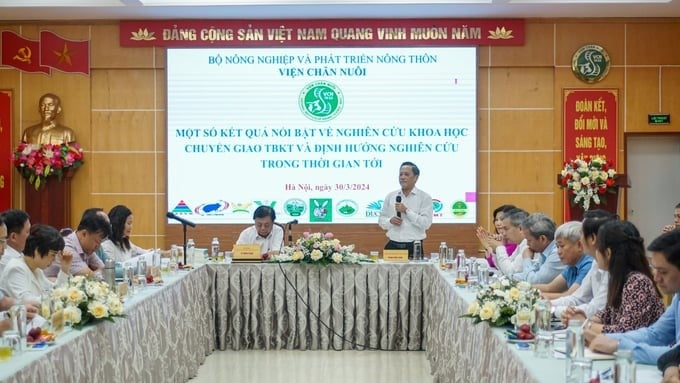November 27, 2025 | 10:11 GMT +7
November 27, 2025 | 10:11 GMT +7
Hotline: 0913.378.918
November 27, 2025 | 10:11 GMT +7
Hotline: 0913.378.918
In the past 5 years, Vietnam's livestock industry has achieved a high average growth rate (4.5–6%/year), of which total live meat output of all types has grown by an average of 2.7%/year; egg output increased by 7.1%/year; and raw fresh milk output increased by 4.5%/year. In 2023, the production value of the livestock industry is estimated to grow by 5.72%, contributing 26% to agricultural GDP.
In addition to the achievements of 2023, Minister of Agriculture and Rural Development Le Minh Hoan wishes that in the coming time, the National Institute of Animal Science will research the field of animal welfare because a sustainable livestock industry cannot lack animal welfare.

Minister of Agriculture and Rural Development Le Minh Hoan worked with the National Institute of Animal Science on March 30. Photo: Hung Khang.
The Minister cited that in European countries, since 2018, people have begun to care about animal welfare by not raising animals in cages. Ensuring animal welfare will be associated with biosecurity and reducing antibiotics in livestock farming. Those will be solutions for livestock products to be eligible for export to many markets.
According to Minister Le Minh Hoan, animal welfare is simply understood as treating animals well so that they are in the best physical and mental state, avoiding unnecessary pain, whether they are animals raised for food, production tools, or pets.

Minister Le Minh Hoan said that consumers are currently very interested in how livestock are cared for. Photo: Hung Khang.
"The increasing incidence of cancer makes us ask the question of whether the food people eat is really good. Therefore, before buying animal meat products, consumers are also interested in how the animals live in the cage," said Minister Le Minh Hoan.
In order for products from cattle and poultry to be free of antibiotic residues and growth substances, instead of letting livestock (laying hens, sows) "liberate" in cages, it is necessary to create conditions for them to live in a free environment according to their behavior. When livestock are not stressed, they will produce more productive and better-quality meat and eggs.
At the conference, Ms. Ngo Thi Kim Cuc, Deputy Director of the National Institute of Animal Science (Ministry of Agriculture and Rural Development), pointed out the limitations of current breed research. Specifically, breed programs are not long-term, leading to a limited number of breeds brought to the market. Therefore, in the coming time, funding for breed programs needs to be extended to ensure the potential of breed programs is fully promoted.
In Vietnam, household farming is still quite popular. The average scale of farmer households is 3–4 pigs/household, accounting for 65% of the total pig herd and more than half of meat output for the market. Chickens raised in farmer households account for 70% of the total herd and 60% of meat output. Currently, the number of households raising chickens is 6.5 million. Nearly 100% of large livestock herds (buffaloes and cows) are raised in farmer households.
Therefore, the Party and State have had many policies to develop household farming towards modernity. In 2014, the Prime Minister issued Decision No. 50/2014/QD-TTg on policies to support improving the efficiency of household farming for the 2015–2020 period. These policies have had positive impacts and brought clear economic efficiency, helping to stabilize people's livelihoods, improving productivity and quality of livestock herds, and increasing the income of livestock households by 5–10%.

Mr. Pham Cong Thieu, Director of the National Institute of Animal Science, spoke at the conference. Photo: Hung Khang.
At the working session with Minister Le Minh Hoan, Mr. Pham Cong Thieu, Director of the National Institute of Animal Science, said that in the coming time, the Institute will continue to pay more attention to the research and development of household farming, especially in remote and mountainous areas. Because household farming by ethnic minorities currently accounts for 13%, promoting research on household farming will help develop economics for the people here.
To do that, the National Institute of Animal Science has strengthened cooperation with agricultural and forestry universities across the country, taking advantage of all resources and intelligence so that the work of researching and developing household farming is highly effective and has practical application.
Besides, to limit the risks brought by household farming, such as low productivity, high disease risk, poor veterinary hygiene and safety, etc., in the coming time, the National Institute of Animal Science plans to develop research and application of new technology to accelerate genetic progress and increase productivity, quality, and health of livestock.
In addition, the National Institute of Animal Science will also increase learning exchanges from countries with developed agriculture, such as the US, Australia, Japan, etc., aiming for joint venture cooperation and technology transfer from the above countries.
Translated by Huyen Vu Thu

(VAN) China’s cooking oil is suddenly flooding into India. It all comes down to a soybean surplus that Beijing doesn’t quite know what to do with.

(VAN) An Giang promotes supply-demand connections, standardizes quality and builds value chains, creating a foundation for sustainable bird’s nest development and aiming to expand exports.
/2025/11/24/5339-4-nongnghiep-075331.jpg)
(VAN) Recently, the conference on 'Sustainable Fisheries Linkage Chain - Tilapia for Export' took place in Tien Hai commune, Hung Yen province.
/2025/11/21/4309-2-153400_128.jpg)
(VAN) Green and low-emission rice is paving the way for Vietnamese rice to enter high-end markets, marking the beginning of a transformation journey toward greening and elevating the national rice brand.

(VAN) ‘Right to Win’ outlines a national action plan that shapes a new vision for Viet Nam’s agriculture in an era of renewal and global integration.

(VAN) Lam Dong’s farmed sturgeon output this year is expected to reach 2,300 tons, worth VND 450 billion, affirming the brand’s position on the market.

(VAN) A surge in Ukrainian egg exports, largely driven by soaring sales to the UK over the last few years, has notably pushed up egg prices on the domestic market.